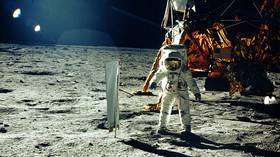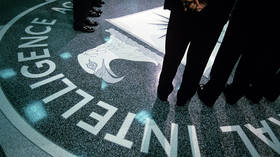Moon landings FACT-CHECK: Russian space geeks seek to fund satellite to scan for lunar mission trace

Were the American lunar landings real or a hoax? A group of Russian enthusiasts are taking the question seriously, seeking sponsors to send a microsatellite to the Moon – to dispel or confirm the longstanding conspiracy theory.
“We deliberately chose targets on the Moon that arouse the greatest public interest,” Vitaly Egorov, the project’s founder, said, explaining why his team decided to search for traces of the Apollo missions on the Earth’s satellite.
“We want to recoup the development and launch of the satellite with private donations and advertising contracts – without any government funding.”
However, Egorov admitted that he still hoped for cooperation with Russia’s space agency, Roscosmos, the Academy of Sciences and major universities “to reduce the cost of the project and increase its scientific and educational value.”
Microsatellites are the future of space exploration due to their being cheaper and easier to launch than larger craft, Nikita Partsevsky, the project’s technical supervisor, said during its presentation in Moscow.
“We hope that our project will create a demand for such devices in Russia. After testing on the Moon, we can build then to the study of Mars, Venus or some asteroids. They can also be used to monitor the Earth for both state and commercial purposes,” he explained.
Also on rt.com No place for Russia in Time’s remake of iconic 1968 Moon Race coverEgorov and his associated started working on their microsatellite in 2015 and even managed to crowdfund 1.7 million rubles (around $27,000) trying to fulfill their ambitious idea.
The design of their spacecraft has changed over the years, with the latest concept envisaging a 70-kilogram satellite with a 40-centimeter antenna to send data back to Earth.
Last year, Roscosmos boss, Dmitry Rogozin, joked that verifying the authenticity of US claims of landing on the Moon was among the aims of Russia’s lunar program. The country plans to create an orbital Moon station within the next ten years before sending the first Russian cosmonauts there in 2030 and establishing a full-scale lunar base between 2036 and 2040.
Also on rt.com Russia will check if Americans really went to the Moon – Roscosmos chiefDespite all the US missions being closely monitored by its space rival, the USSR, at the time, skeptics have been questioning the authenticity of the Apollo program ever since astronaut Neil Armstrong put his feet on the Moon on July 21, 1969. Theorists claim that the Moon landings were actually staged by NASA, which needed to quickly respond to the Soviets after they sent the first man, Yury Gagarin, into space on April 12, 1961.
Alarmingly for NASA, between 7 and 20 percent of Americans still believe their country’s lunar program to be nothing but a hoax, according to various polls. In Russia, the number of those doubting US lunar achievements stands at 57 percent, according to a 2017 survey.
Also on rt.com Waving flag, dodgy footprints & Stanley Kubrick: 50 years of moon landing conspiracy theoriesThink your friends would be interested? Share this story!













